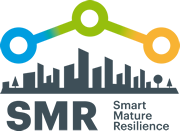Policies
Effort indicators
Resources allocated to incentivize CITY stakeholders to invest in resilience
Results
Percentage of infrastructures and population with insurances
Description
Resources are allocated to provide incentives for sustainable infrastructure to be developed in the city.
Case studies
Riga: Municipal financing program for multi-apartment building
Summary
A large number of buildings in Riga are in need of urgent renovation. The municipality, together with a housing company have started a program to improve the situation through a number of actions.
Further information
 Relevant city context
Relevant city context
Riga is a city of approximately 650 000 inhabitants (1.5 million in Riga region), and is currently undergoing modernisation. This case study is of relevance to other cities in urgent need of modernisation, working on support tools to make changes financially possible for the citizens.
Goal: Support citizens and private company initiatives leading to a sustainable modernisation process of city housing
In Riga, there are over 6,000 buildings built during the post-war period are in need of urgent renovations. The buildings cover a significant amount if the cities total surface, almost 75%, or 12 million m2, and is thus a major project involving many stakeholders. A main challenge is to create a sustainable renovation process, making it attractive and financially possible for people to renovate their homes. Subsidies are part of the solution, and a few smaller programs have previously been launched by the municipal managing company. However, it has been noted that this is not a long-term solution.
The on-going project is more holistic and at a much larger scale than previous programs, including a pre-study of current needs and visions for the future. Along with this are suggestions of support tools, described as a concept, or an “idea” with a substantial amount of documentation to support the idea. For example, a recent support program approved by the council on refurbishments was launched, with a budget of approximately 500k euro. The project is meant to be a pilot project towards the establishment of the a more sustainable solution, a Revolving Fund. Fund. Initial investment will allow renovations to be made at best possible commercial conditions. Repayments from the renovated homes would be used to produce more renovations. The current program intends to make citizens familiar with the process, and increase the interest in potential opportunities.
Cooperation among stakeholders
The project was initiated by the senior Management of the Riga City Council and later led by the Municipal housing company “Rīgas Namu Parvaldnieks”, and includes the financial dept. of the City Council, Municipal construction company, Riga Energy Agency. It was the responsibility of the “Rīgas Namu Parvaldnieks” to investigate the renovation needs as well develop the visions and support tools for action. Important factors in this work have been the strong support from the senior management of the City Council and the high motivation of the “Rīgas Namu Parvaldnieks”.
Outcomes
So far, several multiapartment nine-story houses have been renovated and many more received minor refurbishments. Overall the program has had great success and will be repeated with wider exposure. A lesson learned so far is that stricter guidelines are required for the subcontractors to ensure the quality of the renovations.
Resources
Budget of current program is €500,000.
Other
Video on Revolving Funds.
Subscribe to our newsletter

This project has received funding from the European Union’s Horizon 2020 research and innovation programme under grant agreement no. 653569.
